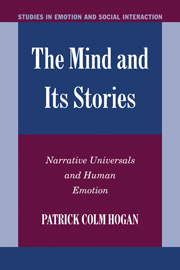Book contents
- Frontmatter
- Contents
- Acknowledgments
- The Mind and Its Stories
- Introduction: Studying Narrative, Studying Emotion
- 1 Literary Universals
- 2 Emotion and Suggestion: Lexical Processes in Literary Experience
- 3 Four Hypotheses on Emotion and Narrative
- 4 Writing Beyond the Ending: A Problem of Narrative, Empathy, and Ethics
- 5 Extending the Theory: Emotion Prototypes, Narrative Junctures, and Lyric Poetry
- 6 Testing, Revision, and the Program of Research in Narrative Universals: Ainu Epic and the Plot of Sacrifice
- 7 The Structure of Stories: Some General Principles of Plot
- Afterword: From the Emotional Nature of Narrative to the Narrative Nature of Emotion
- Works Cited
- Index
- Titles in the series
2 - Emotion and Suggestion: Lexical Processes in Literary Experience
Published online by Cambridge University Press: 11 July 2009
- Frontmatter
- Contents
- Acknowledgments
- The Mind and Its Stories
- Introduction: Studying Narrative, Studying Emotion
- 1 Literary Universals
- 2 Emotion and Suggestion: Lexical Processes in Literary Experience
- 3 Four Hypotheses on Emotion and Narrative
- 4 Writing Beyond the Ending: A Problem of Narrative, Empathy, and Ethics
- 5 Extending the Theory: Emotion Prototypes, Narrative Junctures, and Lyric Poetry
- 6 Testing, Revision, and the Program of Research in Narrative Universals: Ainu Epic and the Plot of Sacrifice
- 7 The Structure of Stories: Some General Principles of Plot
- Afterword: From the Emotional Nature of Narrative to the Narrative Nature of Emotion
- Works Cited
- Index
- Titles in the series
Summary
The study of non-European literary theories is particularly valuable for the isolation of literary universals. Such theories often carry insights into universal patterns that are occluded by European theories, thus patterns that readers may miss, if their attention and understanding are too guided by European approaches. Indian theories are unusually significant for the present study as they are particularly compatible with recent developments in cognitive psychology. Perhaps this is due to the fact that Indian literary theory developed partially in relation to Indian linguistic theory, which is widely considered to have close connections with Chomskyan developments (see, for example, Kiparsky's Pāṇini).
In any case, starting more than two millennia ago, and extending over a millennium, Sanskrit writers developed an elaborate theory of poetics. This theory reached a culmination and a sort of theoretical impasse in the writings of Ānandavardhana and Abhinavagupta. With the aid of cognitive science, we may recognize the value of Sanskrit poetics and develop it beyond the impasse it had reached in the eleventh century. I hope to show that, when redeveloped in the context of cognitive science, the work of these writers provides us with a plausible and productive cognitive theory of poetic feeling, a theory that is not a conclusion, but the start of a larger research program in the field.
More exactly, I shall begin with a broad outline of Sanskrit poetics from its beginnings through Ānandavardhana (for a more detailed discussion, the reader may wish to consult a history of Sanskrit poetics, for example that of Gerow).
- Type
- Chapter
- Information
- The Mind and its StoriesNarrative Universals and Human Emotion, pp. 45 - 75Publisher: Cambridge University PressPrint publication year: 2003



